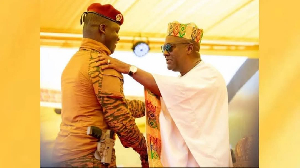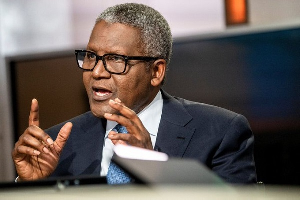DC Kwame Kwakye Blog of Monday, 13 January 2025
Source: KWAME KWAKYE
Six Reasons Traoré Was Right To Arm Up At The Inauguration

Captain Ibrahim Traoré’s decision to wear his sidearm during the inauguration of President Mahama was a calculated move befitting his unique position as a military transitional leader in a politically volatile region. In a landscape marred by tensions, betrayals, and shifting alliances, his choice was more than just symbolic. Here’s why it was justified:
1. Personal Security in an Unpredictable Environment
As a transitional leader in a region where military takeovers have drawn sharp criticism, Traoré remains a prime target. With ECOWAS openly opposing such regimes and vowing to restore constitutional order, hostility from some leaders at the event was a real possibility. The three failed coup attempts against him underscore the constant threats he faces, making his sidearm a necessary precaution to safeguard his life.
2. Learning from History’s Betrayals
Africa’s political history is rife with stories of betrayal. Traoré’s choice echoes the lessons of Thomas Sankara, Burkina Faso’s iconic leader who was assassinated in a betrayal in 1987, and Liberia’s Charles Taylor, whose allies turned against him. Determined not to meet a similar fate, Traoré’s visible readiness symbolises his resolve to stay vigilant and protect himself from potential traitors, even in seemingly friendly environments.
3. A Cautious Approach to Trust
Traoré’s interactions at the inauguration were marked by selective trust. While he shared a warm handshake and embrace with President John Mahama, his demeanour towards others, like President Nana Akufo-Addo, was notably reserved. Traoré has openly criticised leaders he sees as aligned with Western interests or those who oppose his government, deepening the trust deficit. His sidearm underscores his cautious stance and wariness in such settings.
4. A Statement of Independence and Defiance
Beyond personal security, Traoré’s sidearm is a bold symbol of his independence and defiance against neo-colonialism. Rejecting IMF and World Bank loans, expelling French forces, and fostering alliances with Russia, Traoré’s leadership embodies a break from Western dominance. His armed presence serves as a message of self-reliance and a reminder of the military foundation of his authority.
5. Navigating ECOWAS and Regional Tensions
Traoré’s decision must also be viewed in the context of ECOWAS dynamics. The bloc’s leaders, including Chairperson Bola Ahmed Tinubu, have been vocal opponents of military regimes. By carrying his sidearm, Traoré asserted his autonomy and reinforced the legitimacy of his leadership amidst subtle—or overt—challenges from leaders aligned with opposing agendas.
6. Pragmatic Contextual Differences
Critics might question why Traoré didn’t carry a sidearm during his visit to President Putin in Russia. The answer lies in the differing contexts. Traoré views Russia as a supportive ally aligned with his anti-Western stance, whereas West African leaders, especially under ECOWAS, present a more complex and potentially adversarial environment. In Ghana, his sidearm was a prudent acknowledgement of these realities.
It was a calculated, multifaceted decision. It reflected his understanding of personal security, historical lessons, regional dynamics, and the broader statement of his leadership philosophy. In a region fraught with political tensions, Traoré’s move was both symbolic and practical—a reflection of the realities of his position.
By Charles McCarthy














